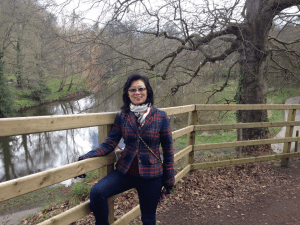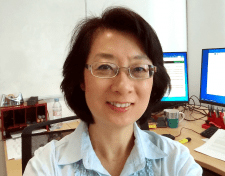My life, my work: Weiru Liu
“I can make contributions not just at the Faculty or the research group level but at the University level too, and it gets me thinking about bigger research strategies rather than just my own immediate research interests.”
Professor Weiru Liu has only been in the Faculty of Engineering at Bristol for a little over four years, but already has made a huge impact, not just in her research into Intelligent Autonomous Systems, but also as School Research Director, Faculty Research Director and more recently in a new role as Associate Dean for Temple Quarter Campus (Research & Enterprise). She tells us about her journey through her career so far.
- Tell us about you – where are you from, who you are outside of work?
I am originally from Jilin province in Northeast China, and I went to study at Jilin University there which is one of the most prestigious universities in China, especially in the 1980s. Before moved to Bristol I lived in Northern Ireland, when I used to do a lot of swimming and walking, but haven’t managed to keep it up unfortunately in Bristol. During the first lockdown I started spending a bit of time in the garden having not done so before – it’s really great to spend time gardening, and for the first time I’ve started planting things and growing from seeds. This will most likely be one of my new passions going forward.
We have two children and most of my spare time used to be spent with them, helping them with their various hobbies (like a taxi driver!). My children have a large age gap so it was like having two “one-child only “ periods, which consumed a lot of our time. I was very much a working mother. Now my sons have left home I have spare time for myself – walking has always been a big thing for me. Bristol is a fantastic city and place for walking – I walk everywhere (including to work) these days, I also visit big country parks near Bristol whenever I could. I have also started reading novels during the Lockdown which I hadn’t done so for ages, including a series of books on Chinese history from ancient times through to 1949.
- Tell us how you got here – what did you do to get here, what decisions did you make, what motivated you?
I did a four-year undergraduate degree in Computer Science, then a 3-year Master degree in Artificial Intelligence (3-year Master course is the norm in China) – I did both degree in China. Then I worked for one and half years as a university lecturer before landed in the UK (Northern Ireland) by chance in 1989. I first worked on a couple of EU projects as a researcher for a little while, then was awarded a prestigious scholarship to do a PhD at the University of Edinburgh in the Department of Artificial Intelligence. In my 3rd year of the PhD study, I became an academic. We never intended (my husband and I) to stay in the UK for so long, but then our children went to school, and we didn’t want to make a move to interrupt their study. Before knowing it, we had spent almost our entire adulthood in the UK!
When I was finishing my PhD, the University of Ulster offered my husband and I two posts (he is also an academic). I worked there for ten years then moved to Queens University Belfast, working there for thirteen years. Then I joined the University of Bristol in 2017 through Direct Appointment. I was the Director of Research for the Knowledge and Data Engineering Cluster at Queen’s University Belfast and then became the School Research Director for SCEEM in Engineering on the second day I was here!

From my perspective, in my generation, being brought up in China, we were educated with the belief that men and women can achieve the same goals through hard work and determination. This has been the belief in my entire career in the UK too … I’ve always been resilient and determined not being affected by gender issues. This has really been something I’ve taken throughout my career.
In terms of my research, I moved from theoretical to applied AI over time, looking into the autonomous aspects of intelligent systems, such as, how to design and develop these systems to gather diverse sources of information and make decisions or take actions autonomously.
- Why do you like your job?
I like it because a) I like the research side, I wanted to be a Professor in a university once I decided to do a PhD, because it’s about exploring the challenges in the real world and having the chance to solve problems that are relevant to all of us. And b) I have always enjoyed teaching, I like sharing knowledge with students, engaging and interacting with young people make yourself feel young too. c) I’ve also spent the last 15 years in management roles too. I saw how the research strategy agenda could be shaped and I could make a difference to things that are important to staff, students and society to happen through this kind of roles. As the more you do, the more likely you could make a positive contribution to helping other people’s careers, helping your workplace to be even better, or changing things that ought to be changed. Being involved in management means that I can make contributions not just at the Faculty or the research group level but at the University level too, and it gets me thinking about bigger research strategies rather than just my own immediate research interests.
4. How do you make it work in terms of work/life balance?
Before my children left home, I had to stop thinking about work when I was with them – which was good for me. Now that they are no longer in the house, I force myself to take breaks, even just to have a quick ten-minute walk here or there. Even now that we are mainly working from home, I dress as if I am going into work to get in the right frame of mind!
- How has career development / promotion happened for you so far?
You have to have clear goals for your career. I would say the key was to be persistent and resilient – every step wasn’t easy and I worked hard for it. Having clear understanding of expectations at each career stage is essential, and I set my own goals as when to achieve what (like getting grants, see through PhDs, top-tier publications, chairing international conferences, public engagement, leadership). I spoke to people in key positions to get their advice, and eventually all the hard work paid off.
I was amazed to discover how many female professors and academics we have here in Bristol, because in other universities I was always one of the very few female colleagues. I was the 1st female professor in Computer Ssience at Queen’s University Belfast. I got used to sitting in a room full of male colleagues! I like having more women in the room – it’s amazing to see contributions from female colleagues: academics, technical and professional services staff…, sometimes it’s even an all-female room, which I am still a bit amazed at! It’s great to see so many women making visible contributions, having a big impact, making a difference – we need to keep it that way.
- How have you been supported, and how do you support others?
I have been supported almost throughout my entire career – I’ve been in three different universities and in each university I have had people supporting me fortunately, either when being a junior academic or being almost ready to take on leadership roles. At every step, there has been support and help, I am very grateful to all of those who have helped me to become who I am and what I have achieved so far.
When I took on the Faculty Research Director role for Engineering, I established the New Academics Forum to help early career researchers get mentoring, peer support, and mainly to not feeling lonely. These are all such important things.
I support others by offering mentoring to people, doing good annual reviews for the people I manage. I have seen people who were ready for promotion and encouraged them to do so, or who weren’t quite ready for promotion and gave them advice on how to change things… I’d look at early career academics and look at their strengths and their uniqueness and help them see where their immediate next steps could be.
- What next?
I recently took on the post of Associate Dean for Temple Quarter (the new campus that University of Bristol is building), which has really exciting opportunities for us in Engineering. I think that if we want to be pushing to developing emerging technologies and addressing new challenges, sometimes you have to show leadership… part of that for me is about sacrificing some of my own research time in order to lead on research for the Faculty. Bristol is an exciting place – it has so many research directions, so many outstanding colleagues – in almost every emerging area, we have capabilities there. We need somebody to bring in the diverse range of expertise and at a higher level bring in a bigger, broader and bolder direction to tackle the problems we need to tackle. Temple Quarter has a defined vision but the ‘how do we get there?’ aspect is not defined yet… we need to work harder to get there.
8. How do you think the CV19 period will change your role or workplace?
People are good at adapting to new things and we are all more connected thanks to technology and online meetings. I’d be happy to work both remotely and onsite – I used to run from meeting to meeting and couldn’t even get a ten-minute coffee break – just being able to continue to join online is helpful. Plus saving commuting time and not getting stuck in traffic is good for me too! I personally am just as effective or more now I am working from home (than in the office) as not wasting time on the road or between meetings or other distractions.
9. If you are interested in Engineering or Computer Science then go for it! This is a truly exciting discipline I believe, you will not be bored at least. Coming out of your comfort zoon and collaborating especially with those outside your discipline can be hugely rewarding. For example, I found that when working with Social Sciences or Health Care people…by collaborating across disciplines, the impact was immediate.
It is a tough career compared to thirty years ago – the world has changed. It is a discipline that changes fast! Do not be afraid to take on something new, to change your research topic a little or collaborate with new people. Be open to new research challenges and new career opportunities can sometimes bring unexpected successes.


